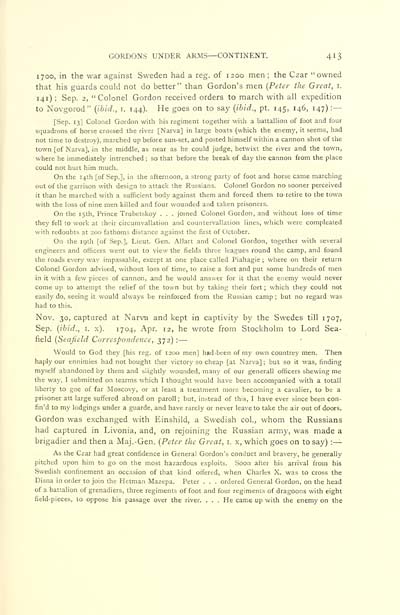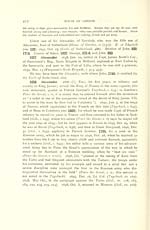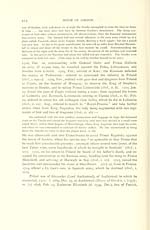New Spalding Club > House of Gordon > Gordons under arms
(503) Page 413
Download files
Complete book:
Individual page:
Thumbnail gallery: Grid view | List view

GORDONS UNDER ARMS — CONTINENT. 413
1700, in the war against Sweden had a reg. of 1200 men; the Czar "owned
that his guards could not do better" than Gordon's men {Peter the Great, i.
141) ; Sep. 2, "Colonel Gordon received orders to march with all expedition
to Novgorod" [Ibid., i. 144). He goes on to say {ibid., pt. 145, 146, 147) : —
[Sep. 13] Colonel Gordon with his regiment together with a battallion of foot and four
squadrons of horse crossed the river [Narva] in large boats (which the enemy, it seems, had
not time to destroy), marched up before sun-set, and posted himself within a cannon shot of the
town [of Narva], in the middle, as near as he could judge, betwixt the river and the town,
where he immediately intrenched; so that before the break of day the cannon from the place
could not hurt him much.
On the 14th [of Sep.], in the afternoon, a strong party of foot and horse came marching
out of the garrison with design to attack the Russians. Colonel Gordon no sooner perceived
it than he marched with a sufficient body against them and forced them to retire to the town
with the loss of nine men killed and four wounded and taken prisoners.
On the 15th, Prince Trubetskoy . . . jomed Colonel Gordon, and without loss of time
they fell to work at their circumvallation and countervallation lines, which were compleated
with redoubts at 200 fathoms distance against the first of October.
On the 19th [of Sep.], Lieut. Gen. Allart and Colonel Gordon, together with several
engineers and officers went out to view the fields three leagues round the camp, and found
the roads every wav impassable, exxept at one place called Piahagie ; where on their return
Colonel Gordon advised, without loss of time, to raise a fort and put some hundreds of men
in it with a few pieces of cannon, and he would answer for it that the enemy would never
come up to attempt the relief of the town but by taking their fort ; which they could not
easily do, seeing it would always be reinforced from the Russian camp ; but no regard was
had to this.
Nov. 30, captured at Narva and kept in captivity by the Swedes till 1707,
Sep. {ibid., i. x). 1704, Apr. 12, he wrote from Stockholm to Lord Sea-
field {Seafield Correspondence, 372) : —
Would to God they [his reg. of 1200 men] had^been of my own countrey men. Then
haply our ennimies had not bought ther victory so cheap [at Narva] ; but so it was, finding
myself abandoned by them and slightly wounded, many of our generall officers shewing me
the way, I submitted on tearms which I thought would have been accompanied with a totall
liberty to goe of far Moscovy, or at least a treatment more becoming a cavalier, to be a
prisoner att large suffered abroad on paroll ; but, instead of this, I have ever since been con-
fin'd to my lodgings under a guarde, and have rarely or never leave to take the air out of doors.
Gordon was exchanged with Einshild, a Swedish col., whom the Russians
had captured in Livonia, and, on rejoining the Russian army, was made a
brigadier and then a Maj.-Gen. {Peter the Great, i. x, which goes on to say) : —
As the Czar had great confidence in General Gordon's conduct and bravery, he generally
pitched upon him to go on the most hazardous exploits. Soon after his arrival from his
Swedish confinement an occasion of that kind offered, when Charles X. was to cross the
Disna in order to join the Hetman Mazepa. Peter . . . ordered General Gordon, on the head
of a battahon of grenadiers, three regiments of foot and four regiments of dragoons with eight
field-pieces, to oppose his passage over the river. ... He came up with the enemy on the
1700, in the war against Sweden had a reg. of 1200 men; the Czar "owned
that his guards could not do better" than Gordon's men {Peter the Great, i.
141) ; Sep. 2, "Colonel Gordon received orders to march with all expedition
to Novgorod" [Ibid., i. 144). He goes on to say {ibid., pt. 145, 146, 147) : —
[Sep. 13] Colonel Gordon with his regiment together with a battallion of foot and four
squadrons of horse crossed the river [Narva] in large boats (which the enemy, it seems, had
not time to destroy), marched up before sun-set, and posted himself within a cannon shot of the
town [of Narva], in the middle, as near as he could judge, betwixt the river and the town,
where he immediately intrenched; so that before the break of day the cannon from the place
could not hurt him much.
On the 14th [of Sep.], in the afternoon, a strong party of foot and horse came marching
out of the garrison with design to attack the Russians. Colonel Gordon no sooner perceived
it than he marched with a sufficient body against them and forced them to retire to the town
with the loss of nine men killed and four wounded and taken prisoners.
On the 15th, Prince Trubetskoy . . . jomed Colonel Gordon, and without loss of time
they fell to work at their circumvallation and countervallation lines, which were compleated
with redoubts at 200 fathoms distance against the first of October.
On the 19th [of Sep.], Lieut. Gen. Allart and Colonel Gordon, together with several
engineers and officers went out to view the fields three leagues round the camp, and found
the roads every wav impassable, exxept at one place called Piahagie ; where on their return
Colonel Gordon advised, without loss of time, to raise a fort and put some hundreds of men
in it with a few pieces of cannon, and he would answer for it that the enemy would never
come up to attempt the relief of the town but by taking their fort ; which they could not
easily do, seeing it would always be reinforced from the Russian camp ; but no regard was
had to this.
Nov. 30, captured at Narva and kept in captivity by the Swedes till 1707,
Sep. {ibid., i. x). 1704, Apr. 12, he wrote from Stockholm to Lord Sea-
field {Seafield Correspondence, 372) : —
Would to God they [his reg. of 1200 men] had^been of my own countrey men. Then
haply our ennimies had not bought ther victory so cheap [at Narva] ; but so it was, finding
myself abandoned by them and slightly wounded, many of our generall officers shewing me
the way, I submitted on tearms which I thought would have been accompanied with a totall
liberty to goe of far Moscovy, or at least a treatment more becoming a cavalier, to be a
prisoner att large suffered abroad on paroll ; but, instead of this, I have ever since been con-
fin'd to my lodgings under a guarde, and have rarely or never leave to take the air out of doors.
Gordon was exchanged with Einshild, a Swedish col., whom the Russians
had captured in Livonia, and, on rejoining the Russian army, was made a
brigadier and then a Maj.-Gen. {Peter the Great, i. x, which goes on to say) : —
As the Czar had great confidence in General Gordon's conduct and bravery, he generally
pitched upon him to go on the most hazardous exploits. Soon after his arrival from his
Swedish confinement an occasion of that kind offered, when Charles X. was to cross the
Disna in order to join the Hetman Mazepa. Peter . . . ordered General Gordon, on the head
of a battahon of grenadiers, three regiments of foot and four regiments of dragoons with eight
field-pieces, to oppose his passage over the river. ... He came up with the enemy on the
Set display mode to: Large image | Transcription
Images and transcriptions on this page, including medium image downloads, may be used under the Creative Commons Attribution 4.0 International Licence unless otherwise stated. ![]()
| Publications by Scottish clubs > New Spalding Club > House of Gordon > Gordons under arms > (503) Page 413 |
|---|
| Permanent URL | https://digital.nls.uk/79786733 |
|---|
| Description | Volumes 47-53 are uniform with but not part of the club's series. |
|---|---|

